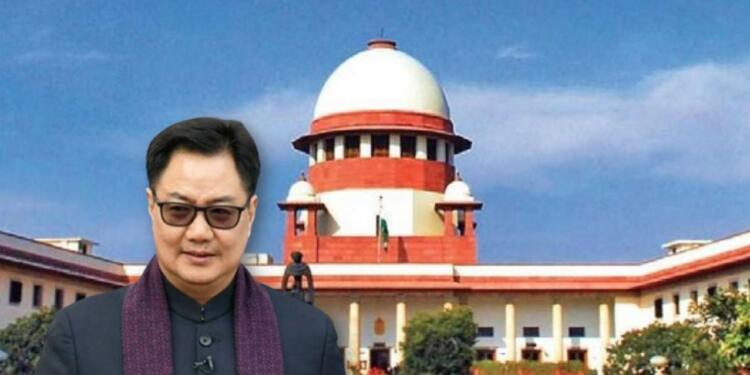- Kiren Rijiju has reminded the judiciary not to cross the ‘Laxman Rekha’
- Supreme Court recently asked governments to pause any kind of development in any of the cases related to Sedition
- Until the law is struck down it should be left to the executive and Legislature to oversee its implementation. Court’s intervention was uncalled for.
There was a time when the Legislature and Judiciary used to act in their own spheres. But the fine balance has been on tenterhooks in recent decades. Lakshman Rekha is constantly getting diluted and that is why India’s law minister Kiren Rijiju had to come forward to protect the dignity of the legislature.
Kiren Rijiju’s clear stance on ‘Laxman Rekha’
India’s Law Minister has categorically stated that there is a clearly demarcated line between all organs of India’s Democracy and no specific body should cross it. Rijiju made a sharp observation on the Court’s ‘hope’ that the Union government will put a stay on all pending cases under Section 124A of the Indian Penal Code (IPC).
Invoking the ‘Lakshman Rekha’, Sri Rijiju said, “We’ve made our positions very clear and also informed the court about the intention of our PM (Prime Minister Narendra Modi). We respect the court and its independence. But there’s a ‘Lakshman Rekha’ that must be respected by all organs of the state in letter and spirit. We have to ensure that we respect the provisions of the Indian Constitution as well as existing laws. We respect each other, the court should respect government, legislature, so as government should also respect court. We have clear demarcation of boundary and that Lakshman Rekha should not be crossed by anybody”
Read more: Indian constitution reeks of colonialism
Modi government’s stand on Sedition
Recently, the Modi government took a bold position in Supreme Court that the Sedition Law in India does not stand the test of time as it was brought forth to rein in the anti-government section of the country during the British era, something which should be acceptable in Democratic India.
A day before the Supreme Court was set to gather and examine the Constitutional validity of the Sedition law, the Centre informed the apex court that the provisions of the law (Section 124A) will be re-examined and reconsidered – after Prime Minister Narendra Modi intervened. The centre noted in an affidavit filed in the SC, “In the spirit of Azadi ka Amrit Mahotsav (75 years of Independence) and the vision of PM Narendra Modi, the Government of India has decided to re-examine and reconsider the provisions of Section 124A, Sedition law.”
The affidavit further added, “The Hon’ble Prime Minister of India has been cognizant of various views expressed on the subject and has also periodically and in various forums expressed his clear and unequivocal views in favour of protection of civil liberties, respect for human rights and giving meaning to constitutionally cherished freedoms by the people of the country”.
Read more: Modi government is set to remove “Sedition Law”. Some Fascism This
The tightrope between Judiciary and Legislature
However, until the final decision of repealing the aforementioned provision is taken, the Modi government opined that the status quo should prevail and pending cases should be allowed to be executed under existing mechanisms. Tushar Mehta, Solicitor General contended that if all existing FIRs are quashed then it will lead to mayhem as a lot of these cases are linked to terrorism and money laundering. Though, the Centre was ready to expedite the process.
“What your lordships can consider is, if there is a stage of bail application involving Section 124A IPC, the bail applications may be decided expeditiously,” submitted Mehta
Read more: The need for Indianization of the Indian constitution in the BJP rule
However, the Court said that it would ‘hope and expect’ respective governments to not register any new FIRs. “We hope and expect that the State and Central Governments will restrain from registering any FIR, continuing any investigation or taking any coercive measures by invoking Section 124A of IPC while the aforesaid provision of law is under consideration,” said Court
It should be the prerogative of the Executive and Legislature
The Supreme Court’s reference to stopping these cases seems to be uncalled for. Generally, if the law is in force, then it is the prerogative of the executive and legislature to oversee its implementation. The fact that Sedition law has been continuing in the country after more than 74 years of independence is the vindication of the fact that the said provision holds some kind of legitimacy in the country. Another point which goes in favour of the continuation of Section 124A (until further Court orders) is the fact that it has not been declared as ultra-vires by the Supreme Court.
Though the wording of the section is such that it is prone to misuse, it can’t be denied that it is also an extremely useful section. It works as a buffer against the anti-national elements. The freedom guaranteed under the Freedom of Expression part of the Indian Constitution is balanced by its restraint under Section 124A of the Indian Penal Code.
Read more: Kangana Ranaut & Ranas: How Mumbai Police chooses its targets for slapping sedition case
It is true that governments of the day have misused it at alternative junctures and that is why the Supreme Court and Centre are working towards either repealing it or bringing changes. But, until both do not reach a unanimous conclusion, it is unwise to snatch a provision as stringent and having as much far-reaching consequence as Sedition Law. Judiciary definitely seems to have crossed ‘Laxman Rekha’ in this case.



























